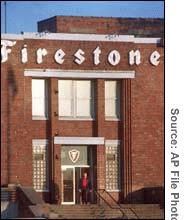|
Firestone may shut plant
|
 |
June 27, 2001: 12:47 p.m. ET
Workers at Illinois plant that made recalled tires get 6-month closing notice
By Staff Writer Chris Isidore
|
NEW YORK (CNNfn) - Bridgestone/Firestone Inc. expects to close the Decatur, Ill., tire plant that made the Wilderness AT tires recalled last year due to reports of tread separations and fatal accidents.
The Japanese-owned tiremaker gave a six-month notice of potential plant closure to the United Steelworkers Union of America, which represents hourly workers at the plant. The company cited the need to reduce production capacity in the United States to more effectively match demand and strengthen the company's core operations.
"While no final decision has been made, the company advised the USWA that the most feasible way to attain the necessary U.S. production level is to close the Decatur, Ill., tire plant," the company's statement said.

|
|
|
The front of the Bridgestone/Firestone plant in Decatur, Ill. The trouble tiremaker announced Wednesday it expects to close the plant in six months. | |
The company also announced Wednesday that the costs of last year's recall has risen $360 million from the previous $550 million estimate. About $60 million of the additional costs comes from direct expenses, and the rest is to cover expected litigation expenses. It also said it would take a $210 million charge to shut the Decatur plant.
A spokesman for the USWA said that the union would still talk to the company about trying to keep the plant open past the end of the year.
"We've been told this is not an irrevocable decision," said Marco Trbovich, a spokesman at the union's Pittsburgh headquarters. Still, Trbovich acknowledged that the recall problem had cut sales and demand for Firestone tires and created an overcapacity.
The plant currently employs about 1,500 workers, including about 100 contractors and 1,350 union members. Another 440 employees there are already on layoff. The plant is only operating at about half of its capacity of 30,000 tires a day, according to John McQuade, division vice president of manufacturing for the tiremaker. Trbovich said about 500 of the union members will be eligible for full retirement benefits under the contract by September of this year.
While the company said it has not made a final decision, comments during a press conference by McQuade and Mike Gorey, the company's controller, left little doubt about company plans to close the Decatur plant.
Gorey said the plant is the company's oldest and in greatest need of investment in order to make it competitive. The two executives said the closing of the plant is necessary to get other Bridgestone/Firestone plants operating at or close to full capacity.
"It is just not efficient to reduce shifts at all plants or keep running all plants at reduce capacity," said McQuade.
| |

|
|
One of the Firestone tires recalled last year that suffered tread failure. The Wilderness AT tires included in that recall were made at the Decatur plant that the tiremaker intends to shut. | |
While other plants made Firestone ATX tires involved in last year's recall of 6 million tires, only the Wilderness AT tires made in Decatur had the failure rates that prompted the recall at that time.
More than 200 U.S. deaths have been tied to accidents involving the tires involved in that recall, mostly on the Ford Explorer sport/utility vehicle.
Bridgestone/Firestone own investigation admitted there were problems with the tires made at the Decatur plant.
"Tires of the same size produced at Decatur exhibited different belt adhesion characteristics, including lower initial adhesion, than those same size and line tires produced at other Bridgestone/Firestone plants," its report stated.
But McQuade insisted several times that the problems with the Decatur tires were in no way a factor in its selection for closure.
"This has absolutely nothing to do with quality, dedication and professionalism of our Decatur employees," he said. "It's a question of supply and demand." As to the findings of the company's investigation, he said that the company probe found the tires failed due to a combination of manufacturing problems, design characteristics and vehicle design.
And Gorey refused to give any measure of the cost difference between operating the unionized Decatur plants and the nonunion plants in Aiken County, S.C., and Wilson, N.C.
"This is not a cost issue," he said. "This is simply a supply and demand issue." The Aiken plant is the company's newest and most automated plant, and McQuade said it is already running at close to capacity. He said that the shutdown would allow the company to recall employees on layoffs at the union plants.
Gorey said the savings from shutting the Decatur plant should come to about $100 million a year. Neither he nor McQuade would give any details about the drop in sales at Bridgestone/Firestone since the original recall, or in the light of last month's announcement that Ford Motor Co. (F: down $0.25 to $24.54, Research, Estimates) has announced it will replace an additional 13 million Wilderness AT tires on all its vehicles, no matter which Bridgestone/Firestone plant made them.
Ford said it ordered the broader recall because it said its analysis of data and test results shows most of those tires also are prone to failure. But even Ford says that the newly recalled tires have a better track record than the Decatur Wilderness tires.
Jac Nasser, CEO of Ford, told a Congressional hearing last week that he believes the Aiken tires to be world class and that Ford included its tires in the recall due to assure customers rather than because of any evidence of failure.
Firestone executives insist there is no problem with the Wilderness tires included in the new recall, and that Ford is doing it in order to divert attention from problems with the safety of its Explorer.
In response to Ford's latest recall, Firestone announced it no longer would sell tires to the world's No. 2 automaker, further reducing future demand for its tires. The company's sales in the replacement market have been hit severely by the earlier recall and new reports of problems.
Gorey insists that Bridgestone/Firestone's plans now see a return to profitability next year, but that in order to do so the Decatur plant must be shut.
Click here to look at automotive stocks
"Our entire company is committed to rebuilding this organization and the Firestone brand," he said. "In order to keep that promise, this company must be financially strong and viable. This is a necessary, but painful step to ensure our continued financial health and viability."
The plant has a controversial history. Many of the recalled tires were made by replacement workers during a 28-month strike by USW at the plant that began in July 1994. Bridgestone/Firestone and the union traded charges after the recall as to whether the replacement workers were qualified to make the tires or whether disgruntled union members returning to work were responsible for the problems. 
|
|
|
|
|
 |

|

